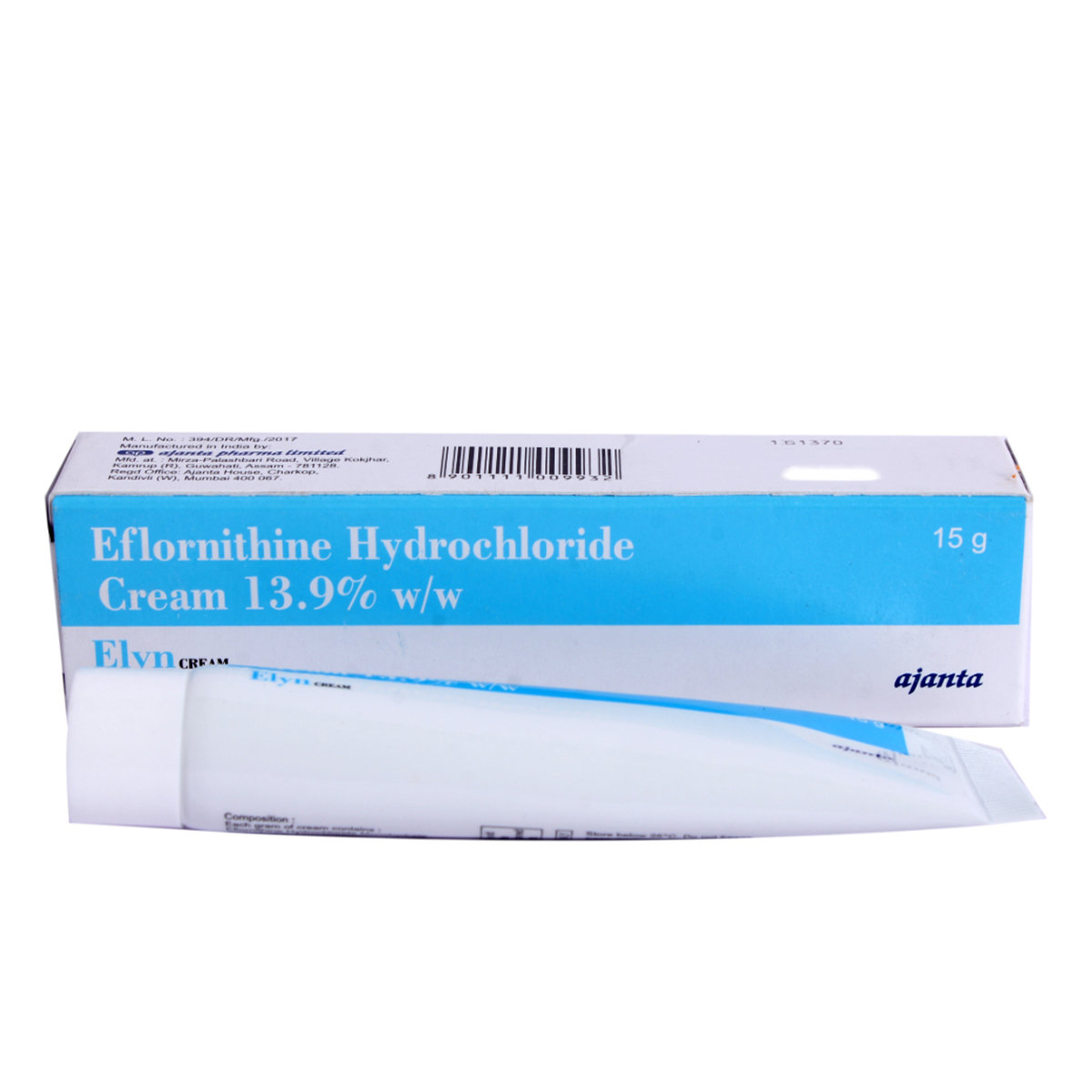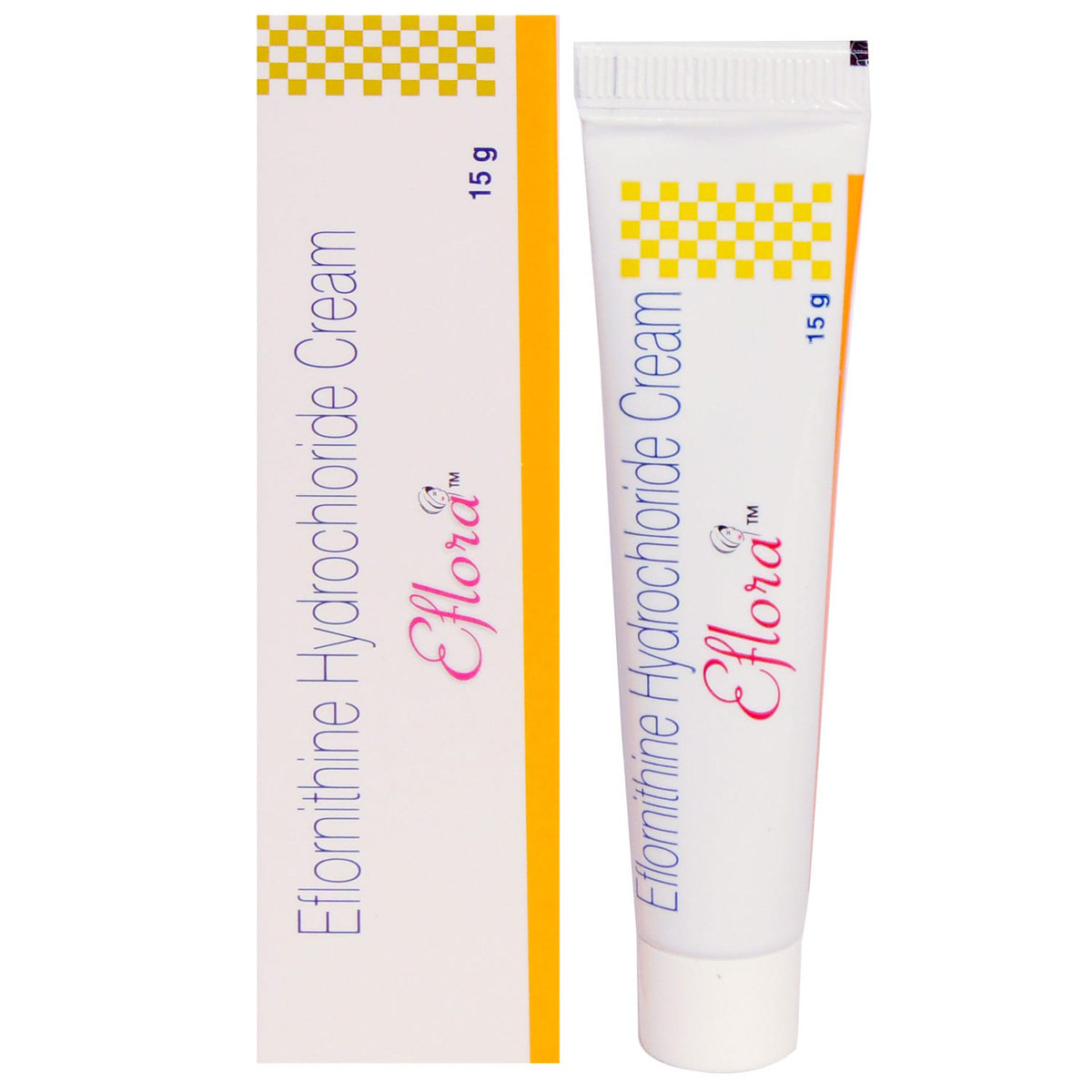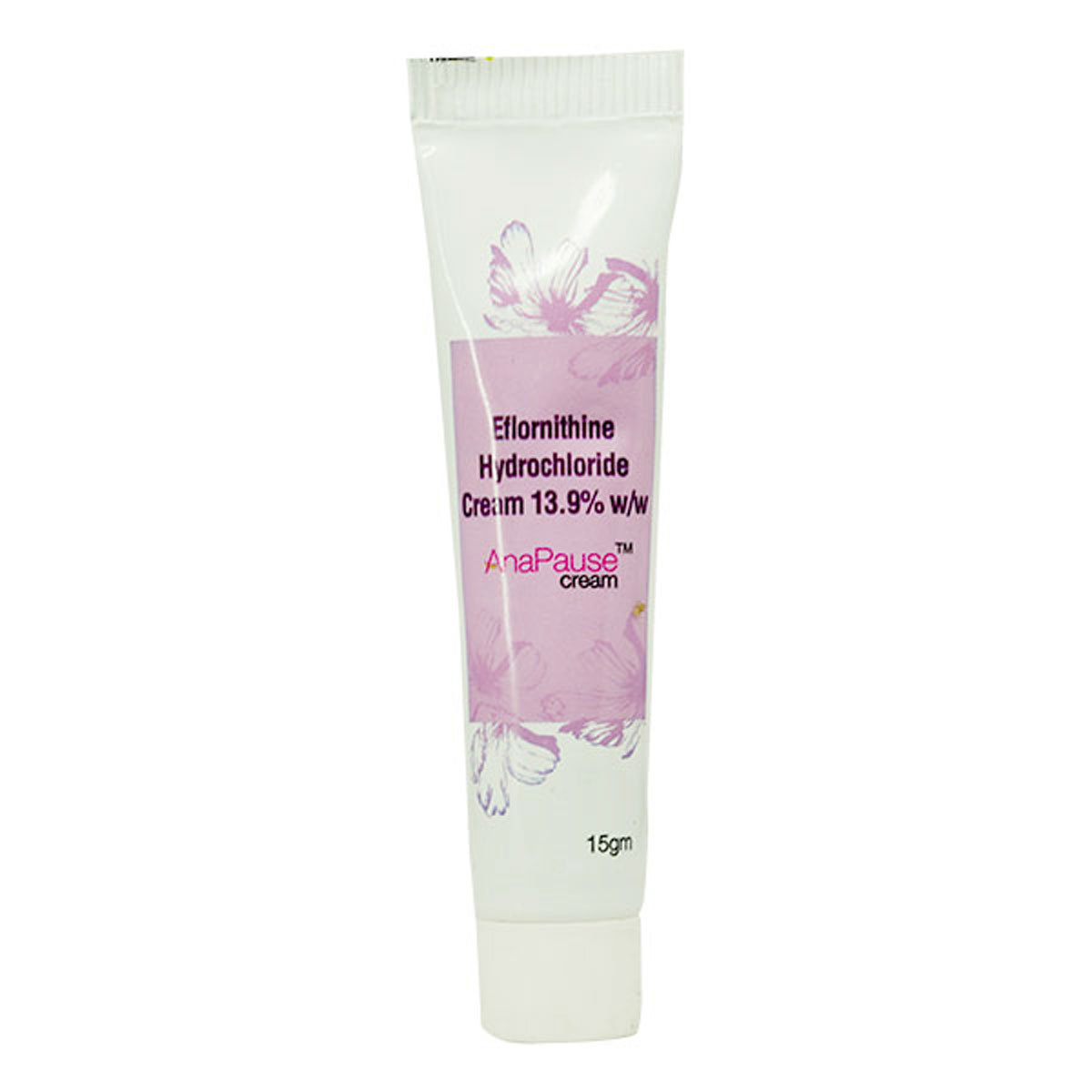Eflornithine
About Eflornithine
Eflornithine belongs to a class of drugs called hair growth retardant used to treat unwanted excess growth of facial hair (facial hirsutism) in women. It is also used to treat African sleeping sickness, a disease caused by protozoa. Facial hirsutism is a condition in women that results in develops excessive hair growth on the face. Unwanted facial hair in women can be a cosmetic problem and may produce emotional distress and mental trauma.
Eflornithine contains Eflornithine is an ornithine decarboxylase (ODC) inhibitor that works by blocking a natural substance ornithine decarboxylase (an enzyme in the body involved in the production of hair) that stimulates hair growth and is located in the hair follicle (the sac where each hair grows). Eflornithine is also used to treat African sleeping sickness (a disease caused by parasite infection).
Use Eflornithine as prescribed by your doctor. You are advised to use Eflornithine for as long as your doctor has prescribed it for you based on your medical condition. Some people may experience acne, burning sensation, itching, scaling, skin dryness, mild tingling sensation or tenderness at the application site, bleeding, sore throat, and fever. Most of these side effects of Eflornithine do not require medical attention and gradually resolve over time. However, if the side effects persist or worsen, please consult your doctor.
If you are allergic to Eflornithine or any other medicines, please tell your doctor. If you are pregnant or a breastfeeding mother, it is advised to consult a doctor before using Eflornithine. Eflornithine is not recommended for use in children below 12 years. Inform your doctor if you have acne, anemia, or other blood problems, hearing loss and kidney or liver problems before using Eflornithine. Do not apply Eflornithine on sunburned, cuts, grazes and broken skin. Besides this let your doctor know if you use any prescription and non-prescription medications you are taking, including vitamins, before starting Eflornithine.
Uses of Eflornithine
Medicinal Benefits
Eflornithine contains Eflornithine used to slow the growth of unwanted hair on the face in women, usually around the lips or under the chin. It works by blocking a natural substance ornithine decarboxylase (an enzyme in the body involved in the production of hair) that stimulates hair growth and is located in the hair follicle (the sac where each hair grows). Eflornithine slows hair growth and may also make the hair finer and lighter. It does not remove hair or cause the hair to fall out. Besides this, Eflornithine also used to treat African sleeping sickness, a disease caused by protozoa (Trypanosoma brucei).
Directions for Use
Storage
Side Effects of Eflornithine
- Acne
- Itching
- Skin redness
- Hair loss
- Burning sensation
- Stinging sensation
- Irritation
- Fever
- Sore throat
- Unusual bleeding or bruising
- Dizziness
Drug Warnings
Do not use Eflornithine if you are allergic to Eflornithine or inactive ingredients (such as methylparaben), which can cause allergic reactions or other problems. It is essential to let your doctor know if you are pregnant, planning to conceive or a breastfeeding mother before using Eflornithine. Please inform your doctor if you are using any prescription and non-prescription medications you are taking, including vitamins, before starting Eflornithine. Do not apply Eflornithine on the irritated and sunburned skin, cuts graze, and broken skin. Let your doctor know if you have had acne, liver, or kidney problems before using Eflornithine. Before you apply cosmetics or sunscreen wait until Eflornithine dries completely. Do not wash the treatment areas for at least 4 hours after using Eflornithine. Before using Eflornithine you should wait for 5 minutes after using your current method of hair removal. This medicine may take 4-6 weeks or longer before you see the full benefit. Do not stop applying Eflornithine without informing your doctor. Stopping the use of this medicine will resume hair growth. If you do not see any improvement after using it for 4 months contact your doctor. Eflornithine is not a depilatory (hair remover) cream, so you may need to continue with your hair removal methods like shaving or plucking.
Drug Interactions
Drug-Drug Interactions: No interaction found.
Drug-Food Interactions: No interaction found.
Drug-Disease Interactions: Before using Eflornithine, let your doctor know if have acne on your face, a blood disorder, hearing disorder, liver and kidney diseases.
Drug-Drug Interactions Checker List:
Safety Advice

Alcohol
cautionInteraction of Eflornithine with alcohol is unknown. Please consult a doctor before consuming alcohol while using Eflornithine.

Pregnancy
cautionEflornithine is a pregnancy category C drug. Please consult a doctor if you are pregnant. Eflornithine is prescribed to pregnant women only if the doctor thinks benefits outweigh risks.

Breast Feeding
cautionIt is unknown whether Eflornithine is excreted in human milk. Therefore, Eflornithine is given to breastfeeding mothers only if the doctor thinks benefits are greater than risks.

Driving
safe if prescribedEflornithine usually does not affect your ability to drive or operate machinery.

Liver
cautionLet your doctor know if you have any history of liver diseases or hepatic impairment. Your doctor will weigh the benefits and potential risks before prescribing Eflornithine.

Kidney
cautionLet your doctor know if you have any history of kidney diseases or renal impairment. Your doctor will weigh the benefits and potential risks before prescribing Eflornithine.

Children
unsafeEflornithine is not recommended for children below 12 years of age, as the safety and effectiveness were not established.
Habit Forming
Diet & Lifestyle Advise
- Manage stress, eat healthily, drink plenty of water, exercise regularly, and sleep peacefully.
- A mixture of gram flour, turmeric, and curd marginally reduced hair growth. Apply this mixture on the face and rinse it after it dries.
- Maintain a healthy weight. If you are overweight, your body may make fewer male hormones.
- Wear protective clothing and use sunscreen while going out to protect your skin from sunburn.
- Regular exercise can improve your mood and self-esteem though it doesn’t clear acne. Take a shower immediately after finishing exercise as sweat may irritate acne.
- Remove the make-up completely before going to bed.
- Avoid or limit the intake of alcohol and caffeine.
Special Advise
Consult your dermatologist if you do not notice any improvement after 4 months of treatment with Eflornithine.
Patients Concern
Disease/Condition Glossary
Facial hirsutism: It is a condition in women that results in develops excessive hair growth on the face. It may be caused by an increase in levels of androgen (male hormone), menopause-related hormone changes and the most common cause is polycystic ovary syndrome (PCOS) (a hormonal disorder causing enlarged ovaries with small cysts on the outer edges) or if you take medicines that can induce hair growth like cyclosporine (following organ transplants), glucocorticoids (against rheumatic or allergic diseases), minoxidil (against high blood pressure), etc. Unwanted facial hair in women can be a cosmetic problem and may produce emotional distress and mental trauma.
African sleeping sickness: It is a disease caused by the infection of a parasite called Trypanosoma brucei. It is transmitted to humans by tsetse fly bites. The tsetse flies are found only in rural Africa. Symptoms include fever, severe headaches, irritability, extreme fatigue, swollen lymph nodes, and aching muscles and joints.
FAQs
Eflornithine contains Eflornithine that stops the activity of an enzyme called ornithine decarboxylase that involved in the production of hair on the face. It also used to treat sleeping sickness (a disease caused by a protozoan infection in Africa).
Yes, Eflornithine may cause skin irritation, redness or peeling in some people. However, if the irritation persists or worsens, stop using Eflornithine and consult a doctor.
Eflornithine usually improves your skin condition in 4 to 8 weeks or longer of treatment. If you notice no improvement after a 5-6 month of treatment, please reach out to your doctor.
Eflornithine is for topical (for skin) use only. Do not apply Eflornithine on open wounds or on sunburned, windburned, dry, chapped or irritated skin, mucous membranes, lesions, or large areas of skin. If the medicine gets into your eyes, nose or mouth, rinse with cold water. This medicine is for use only on the face and chin. Do not apply to other areas of the body.
No, it is not advised to stop using Eflornithine even after your symptoms are relieved. You should complete the full course of treatment. You might see improvement in your symptoms, but hair growth may return to pretreatment levels after you stop using eflornithine topical. Consult your doctor for further advice.








